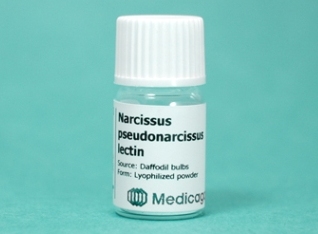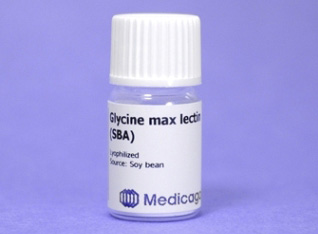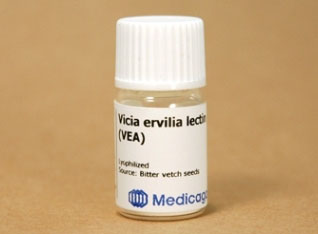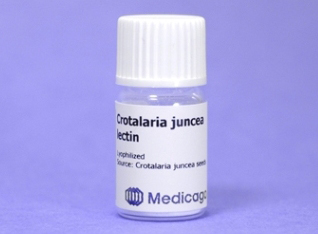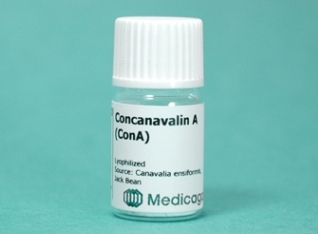
$72.00
Concanavalin A (Con A) lectin is isolated from Jack beans (Canavalia ensiformis) and purified by affinity chromatography. 100 mg. Details available on our website.
PRODUCT DESCRIPTION
Medicago AB Products Are Available Worldwide. For Research Use Only. Concanavalin A (Con A) is a lectin isolated from Jack beans (Canavalia ensiformis) by affinity chromatography. It has 4 subunits and a molecular weight of 104 kDa. Con A is the most widely used lectin and has broad applicability. It reacts with non-reducing α-D-glucose and α-D-mannose. Con A binds specifically to certain structures found in various sugars, glycoproteins and glycolipids. It has been utilized in hormone receptor studies, mitogenic assays and for characterizing normal and malignant cells (cancer cells are readily aggregated by Con A while normal cells are not). Con A can initiate cell division (mitogenesis). Immobilized Con A has been used in affinity chromatography purifications of a wide variety of glycoproteins and cellular structures. Concanavalin A lectin is supplied without preservatives as a lyophilized white powder or flocculate from 0.5 mM MnCl2, 0.5 mM CaCl2. For laboratory use only.
Concanavalin A (Con A) lectin is isolated from Jack beans (Canavalia ensiformis) and purified by affinity chromatography. 100 mg. Details available on our website.
PRODUCT CHARACTERISTICS
Sugar specificity: α-Man, α-Glc.
Mitogen acting principally on T-lymphocytes.
Reacts with a number of bacterial and animal cells.
High activity.
PRODUCT COMPONENTS
Appearance: White lyophilized powder.
Source: Jack beans.
Molecular weight: 104 kDa.
Sugar specificity: α-Man, α-Glc.
Activity: Con A reacts with a number of bacterial and animal cells and can distinguish between certain normal and tumor cells. It can initiate cell division (mitogenesis). 0,5-10 µg/ml is required to visibly agglutinate neuraminidase treated erythrocytes.
Microorganisms: < 100 CFU/g. Protein content: > 90%, OD280nm (ε 1 mg/ml = 1.14), > 95%, essentially salt free.
Identity: SDS-PAGE, four bands corresponding to the four subunits.
Shelf life: Five years when stored at -20°C.
PRODUCT APPLICATION
Hormone receptor studies.
Lymphocyte mitogenic studies.
Characterization of certain normal and malignant cells.
Related Products

